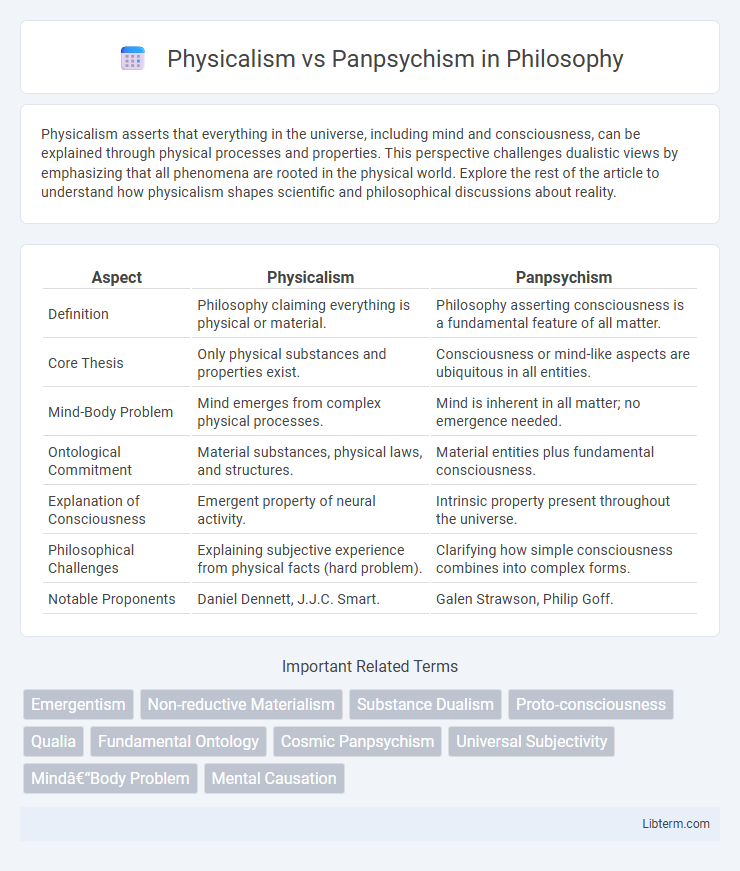Physicalism asserts that everything in the universe, including mind and consciousness, can be explained through physical processes and properties. This perspective challenges dualistic views by emphasizing that all phenomena are rooted in the physical world. Explore the rest of the article to understand how physicalism shapes scientific and philosophical discussions about reality.
Table of Comparison
| Aspect | Physicalism | Panpsychism |
|---|---|---|
| Definition | Philosophy claiming everything is physical or material. | Philosophy asserting consciousness is a fundamental feature of all matter. |
| Core Thesis | Only physical substances and properties exist. | Consciousness or mind-like aspects are ubiquitous in all entities. |
| Mind-Body Problem | Mind emerges from complex physical processes. | Mind is inherent in all matter; no emergence needed. |
| Ontological Commitment | Material substances, physical laws, and structures. | Material entities plus fundamental consciousness. |
| Explanation of Consciousness | Emergent property of neural activity. | Intrinsic property present throughout the universe. |
| Philosophical Challenges | Explaining subjective experience from physical facts (hard problem). | Clarifying how simple consciousness combines into complex forms. |
| Notable Proponents | Daniel Dennett, J.J.C. Smart. | Galen Strawson, Philip Goff. |
Introduction to Physicalism and Panpsychism
Physicalism asserts that everything in the universe is physical or supervenes on physical entities, positing that mental states are entirely reducible to physical processes in the brain. Panpsychism, contrastingly, holds that consciousness is a fundamental and ubiquitous feature of all matter, suggesting that even elementary particles possess some form of experiential qualities. These competing metaphysical perspectives address the mind-body problem by either denying the existence of non-physical substances or by attributing proto-consciousness to all physical entities.
Historical Background of Both Philosophies
Physicalism, rooted in 17th-century materialism, gained prominence with figures like Descartes and later the scientific revolution emphasizing matter and energy as fundamental. Panpsychism dates back to ancient philosophy, notably in the works of Plato and Spinoza, asserting that consciousness is a universal feature of all matter. Over time, physicalism dominated mainstream science, while panpsychism resurfaced in contemporary philosophy for addressing the hard problem of consciousness.
Core Principles of Physicalism
Physicalism asserts that everything in the universe is fundamentally physical, grounded in matter and energy governed by natural laws. It emphasizes that all mental states and consciousness arise from physical processes in the brain, rejecting the existence of non-physical substances. This core principle supports a scientific framework where phenomena are explainable through physics and neuroscience, distinguishing it from dualistic or panpsychist perspectives.
Fundamental Tenets of Panpsychism
Panpsychism asserts that consciousness is a fundamental and ubiquitous feature of the universe, present even at the level of elementary particles. Unlike physicalism, which reduces mental states to physical processes in the brain, panpsychism posits that all matter possesses some form of experiential quality or proto-consciousness. This view challenges the strict materialist ontology by attributing intrinsic mental properties to the basic constituents of reality.
Comparing Consciousness Explanations
Physicalism explains consciousness as a result of complex interactions within neural networks and brain activity governed by physical laws, emphasizing measurable phenomena in neuroscience. Panpsychism posits that consciousness is a fundamental and ubiquitous feature of all matter, suggesting that even subatomic particles possess proto-conscious qualities. This contrast highlights the debate between consciousness as emergent from physical processes versus consciousness as an intrinsic property of the universe.
Strengths and Weaknesses of Physicalism
Physicalism excels in its robust explanatory framework grounded in empirical science, effectively accounting for physical phenomena through well-established laws of physics and neuroscience. However, it struggles to adequately explain subjective experience, often referred to as the "hard problem of consciousness," where it falls short in addressing qualia and intrinsic mental states. This intrinsic limitation opens the door for alternative views like panpsychism, which propose that consciousness is a fundamental aspect of all matter, challenging the reductionist approach of physicalism.
Panpsychism’s Appeal and Challenges
Panpsychism appeals as it attributes consciousness to all matter, addressing the hard problem of consciousness by positing experience as a fundamental property of the universe. This view offers a unified framework bridging physical science and subjective experience, challenging the reductionist limitations of physicalism. However, panpsychism faces the combination problem, questioning how simple proto-consciousness aggregates into complex minds, and struggles with empirical testability within current scientific paradigms.
Major Thought Experiments and Arguments
The Knowledge Argument, exemplified by Frank Jackson's Mary's Room, challenges physicalism by suggesting that complete physical knowledge may not capture subjective experiences, or qualia. The Combination Problem poses a central difficulty for panpsychism, questioning how micro-level conscious experiences combine to form unified, macro-level consciousness. Another influential thought experiment, the Zombie Argument, posits the conceivable existence of physically identical beings lacking consciousness, undermining physicalist accounts of mind.
Implications for Science and Philosophy
Physicalism asserts that all phenomena can be explained by physical processes and natural laws, providing a clear framework for scientific investigation that prioritizes empirical evidence and testability. Panpsychism proposes that consciousness is a fundamental feature of all matter, challenging conventional scientific paradigms and prompting a reevaluation of subjective experience in the philosophy of mind. This debate influences research methodologies, with physicalism favoring reductionism and panpsychism encouraging interdisciplinary approaches that integrate consciousness studies with physics and metaphysics.
Future Directions in the Debate
Emerging research in neuroscience and quantum physics is likely to deepen the understanding of consciousness, potentially bridging gaps between Physicalism and Panpsychism. Advances in artificial intelligence may challenge traditional physicalist views by prompting reevaluation of subjective experience embedded in all matter, a core Panpsychism claim. Future interdisciplinary studies integrating philosophy of mind, cognitive science, and physics are expected to clarify whether consciousness is a fundamental property or an emergent phenomenon.
Physicalism Infographic

 libterm.com
libterm.com